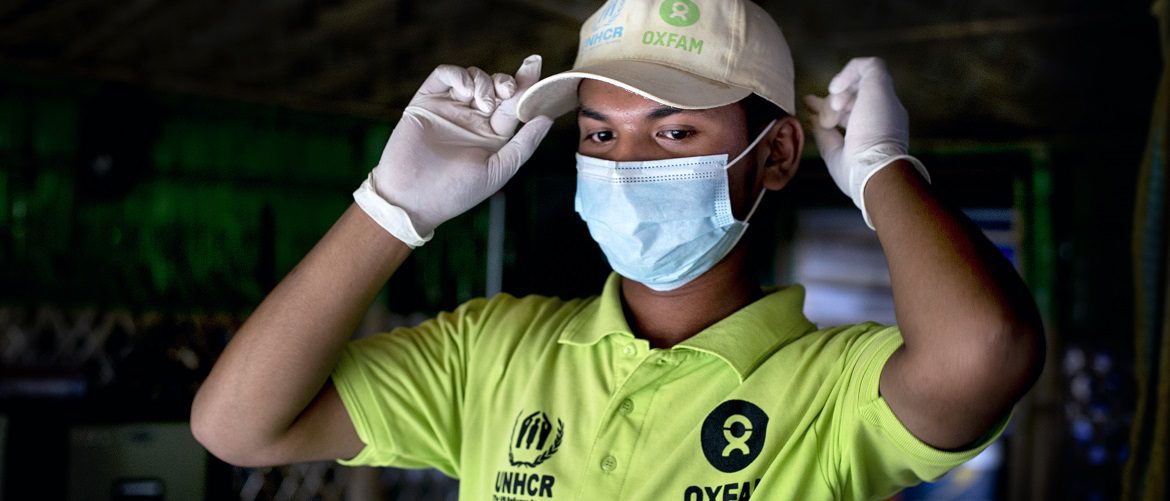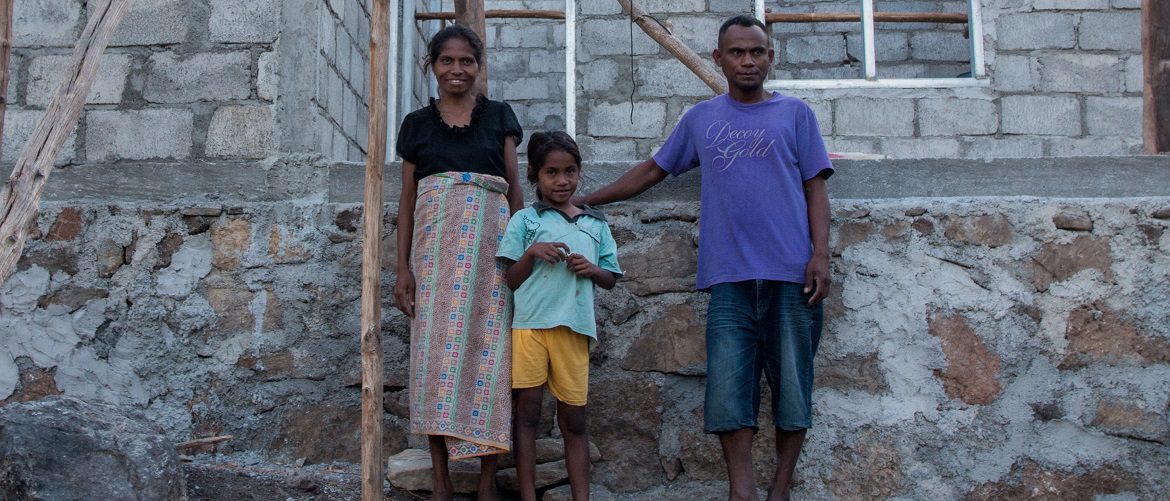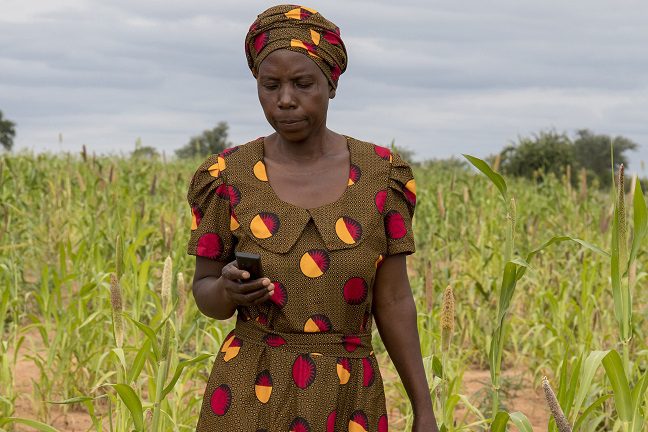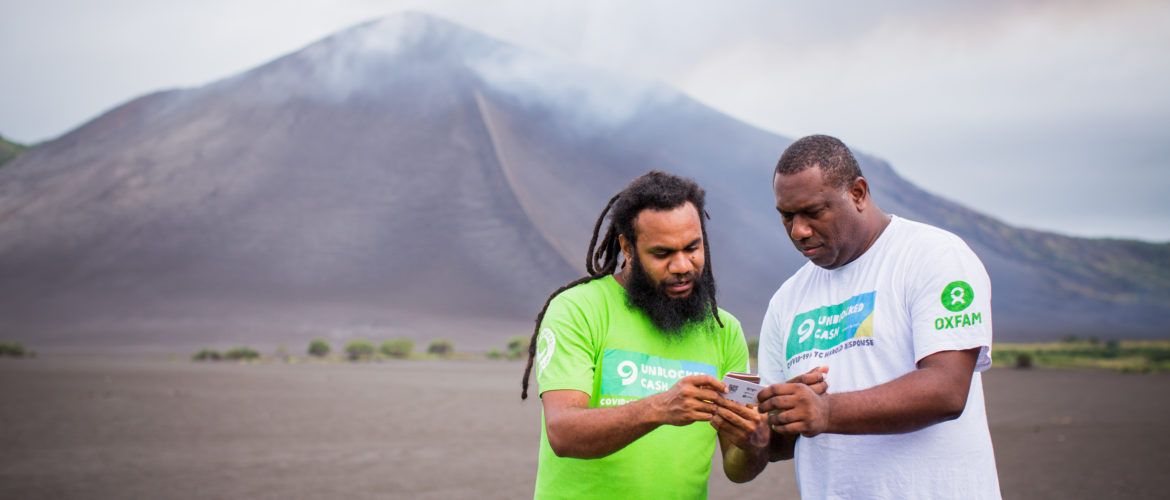Voices JULY 2021
You & Oxfam, tackling poverty together
Thanks to you
With support and solidarity from kind, caring people like you, we’ve changed so many people’s lives for the better.
- We’re working around the clock to help vulnerable communities survive the pandemic. Worldwide, we’ve reached more than 14 million people with vital aid.
- We reached more than 6,000 people affected by the tragic explosion in Beirut on 4 August 2020.
- In Timor-Leste, our Hakbiit project is empowering women to engage in economic and political spheres, and lift themselves out of poverty.

Cox’s Bazar, Bangladesh: Oxfam volunteer Zahid Hossain works with caution to help contain Covid-19 outbreaks in the crowded Rohingya refugee camp. Photo: Fabeha Monir/Oxfam.
Stopping the spread
From refugee camps in Bangladesh to the streets of India, the pandemic continues to wreak havoc right across the globe. But thanks to huge-hearted people like you, we are working against time to stop the spread.
In the last year, the word “unprecedented” has been used by many politicians and medical experts to make sense of the chaos that is Covid-19. This unprecedented global crisis needs an unprecedented global response — and that’s exactly what Oxfam is doing.
With your support, we are working with 694 partners in 68 countries to save lives and defeat this insidious disease. The scale of our Covid-19 response is extraordinary.
With your support, we are working with 694 partners in 68 countries to save lives and defeat this insidious disease. The scale of our Covid-19 response is extraordinary.
- More than 14 million people in vulnerable communities around the world have received direct support from Oxfam partners.
- We’ve shared vital information about the public health risks of Covid-19 with more than 42 million people.
- We have supplied water for around 2 million people.
- More than 965,000 people have received emergency hygiene kits.
In Cox’s Bazar — a crowded refugee camp in Bangladesh that’s home to more than 855,000 people — we have stepped up our hygiene promotion work and scaled up activities like soap distribution. Oxfam volunteer Zahid (pictured) works in the camp. He says, “I am happy to provide support for my community. If we do not provide our services and stop spreading message how to fight against coronavirus, there will be more cases of Covid in the camp — and more people will die.
“This is why I am working in the field. Every day we are helping our community with soap, water and by providing valuable information during this crisis.”Bangladesh is one of 58 countries where Oxfam is stopping the spread by providing clean water and hygiene support, as well as safer sanitation. Alongside this immediate aid, Oxfam — with a coalition of allies — is advocating for a people’s vaccine, which is available to all, in all countries, free of charge. In recent weeks, this fight for more equitable access to Covid-19 vaccine has gained real momentum.
Find out more about Oxfam’s global Covid-19 response

Photo: Ismenio Pereira/Oxfam
Realising their dreams
Before she put pen to paper, Natalia’s dream for a new house may have seemed unattainable. But her happy new home is proof that if you can see it, you can be it.
Like many women In Timor-Leste, Natalia always did the lion’s share of work at home. That all changed after she and her husband Norberto took part in Hakbiit, Oxfam’s gender justice and savings project.
Through the project, they mapped out a Vision Journey on paper. This planning and visualisation activity helps couples identify and address gender norms that disempower women.
Natalia and Norberto figured out the steps to achieve their dream of building a new house by plotting the journey, together. They set timebound milestones and targets, and identified obstacles that might keep them from achieving that dream. Then, they found a clear way forward.
Natalia says, “When my husband and I were introduced to [the project], we shared our gender balance tree with each other, and did the Vision Journey together to finalise building our house. My husband realised he spent too much time on himself, rather than help me with household tasks,” Natalia says.
Norberto adds, “I never did any domestic work at home, everything was done by my wife. But now, we share responsibilities. We try to work together to use our time more effectively to achieve our vision.”
In Timor-Leste, around 42% of people live below the poverty line. This inequality disproportionately affects women, particularly those in rural areas or with disabilities. Women in Timor-Leste have uneven access to education and work opportunities.
But the Hakbiit project — in the local language, “hakbiit” means empowerment — is changing that. The project empowers women to take part in social, economic and political spheres, so they have more control over their own lives, can earn a living, and are heard in public spaces.
Natalia and Norberto are farmers and members of an Oxfam-supported Savings for Change group. The group has helped them better manage their finances.
Natalia says, “Our income increased from selling animals and our agricultural production.”
“We invested in livestock, which now brings in most of our family’s income.”
Business is booming for Natalia and Norberto’s betel leaf and nut plantation, which means they can save more. Smiling proudly, Natalia says, “Last year, we used [our savings] to buy a pig and a goat.”
Through the project, they mapped out a Vision Journey on paper. This planning and visualisation activity helps couples identify and address gender norms that disempower women.
Natalia and Norberto figured out the steps to achieve their dream of building a new house by plotting the journey, together. They set timebound milestones and targets, and identified obstacles that might keep them from achieving that dream. Then, they found a clear way forward.
Natalia says, “When my husband and I were introduced to [the project], we shared our gender balance tree with each other, and did the Vision Journey together to finalise building our house. My husband realised he spent too much time on himself, rather than help me with household tasks,” Natalia says.
Norberto adds, “I never did any domestic work at home, everything was done by my wife. But now, we share responsibilities. We try to work together to use our time more effectively to achieve our vision.”
In Timor-Leste, around 42% of people live below the poverty line. This inequality disproportionately affects women, particularly those in rural areas or with disabilities. Women in Timor-Leste have uneven access to education and work opportunities.
But the Hakbiit project — in the local language, “hakbiit” means empowerment — is changing that. The project empowers women to take part in social, economic and political spheres, so they have more control over their own lives, can earn a living, and are heard in public spaces.
Natalia and Norberto are farmers and members of an Oxfam-supported Savings for Change group. The group has helped them better manage their finances.
Natalia says, “Our income increased from selling animals and our agricultural production.”
“We invested in livestock, which now brings in most of our family’s income.”
Business is booming for Natalia and Norberto’s betel leaf and nut plantation, which means they can save more. Smiling proudly, Natalia says, “Last year, we used [our savings] to buy a pig and a goat.”
After the blast
![Badly damaged buildings which were hit by the August 4th explosion; a massive blast which killed over 180 people, injured more than 6,500 and displaced some 300,000 residents, in Beirut, Lebanon, on August 25, 2020.
[Sam Tarling / Oxfam]](https://oxfamautest.wpenginepowered.com/wp-content/uploads/2021/06/20200902114041pm_GO5B3622_648x432.jpg)
If you saw the images of the blast that tore Beirut apart on 4 August 2020, you can’t unsee them — it was devastating. But thanks to the generosity of people like you, we’re on the ground in Lebanon, helping people pick up the pieces.
The explosion claimed 180 lives, left thousands of people injured and displaced thousands more. About 40,000 buildings were damaged, many beyond repair. And in the weeks that followed, more than 70,000 people lost their jobs.
Even before the blast, Lebanon was at breaking point — people were struggling to cope with a collapsing economy and a global pandemic.
Bachir Ayoub at Oxfam Lebanon said this “crisis on crises” will create huge challenges for people for years to come.
Thanks to the many kind people who gave to Oxfam’s emergency appeal, we are working with 14 local partners in Lebanon to help those who lost their homes and livelihoods in the blast.
Together, we’ve reached more than 6,000 people so far with vital aid — and the recovery effort is ongoing.
The explosion claimed 180 lives, left thousands of people injured and displaced thousands more. About 40,000 buildings were damaged, many beyond repair. And in the weeks that followed, more than 70,000 people lost their jobs.
Even before the blast, Lebanon was at breaking point — people were struggling to cope with a collapsing economy and a global pandemic.
Bachir Ayoub at Oxfam Lebanon said this “crisis on crises” will create huge challenges for people for years to come.
Thanks to the many kind people who gave to Oxfam’s emergency appeal, we are working with 14 local partners in Lebanon to help those who lost their homes and livelihoods in the blast.
Together, we’ve reached more than 6,000 people so far with vital aid — and the recovery effort is ongoing.
One step ahead

In drought-wracked Zimbabwe, we’re arming Sifiso’s community with the information they need to stay one step ahead of the unpredictable climate, so they can farm smarter, not harder.
Like all farmers, Sifiso’s livelihood depends on the weather. She says, “I get my income from farming … We farm vegetables, peanuts, sorghum and cowpeas. Sometimes, we grow millet and maize.
“In the past four years, our harvest has reduced — we’ve experienced a lot of drought. We’ve had dry spells for up to two months.
“Oxfam has supported us with sorghum seed, but the lack of water is affecting us.”
Sifiso is hoping for rain. When the rains finally come, she’ll be ready to spring to action.
“The Oxfam weather station helps us to know when to plant. We get messages on our phone with weather alerts.
“The alerts have made a difference. I have more solid information of rain to come. I’m grateful. Now, I’m more aware.”
Like all farmers, Sifiso’s livelihood depends on the weather. She says, “I get my income from farming … We farm vegetables, peanuts, sorghum and cowpeas. Sometimes, we grow millet and maize.
“In the past four years, our harvest has reduced — we’ve experienced a lot of drought. We’ve had dry spells for up to two months.
“Oxfam has supported us with sorghum seed, but the lack of water is affecting us.”
Sifiso is hoping for rain. When the rains finally come, she’ll be ready to spring to action.
“The Oxfam weather station helps us to know when to plant. We get messages on our phone with weather alerts.
“The alerts have made a difference. I have more solid information of rain to come. I’m grateful. Now, I’m more aware.”

On the frontline
Vanuatu is just a few hours from Australia; but our Ni-Vanuatu neighbours face challenges that you and I can only imagine. They live with the constant threat of disasters.
The World Risk Index ranks Vanuatu as the most vulnerable country in the world to natural disasters, including earthquakes and cyclones. Vanuatu lies on top of the Pacific Ring of Fire, a region that’s prone to deadly earthquakes, tsunamis and volcanic eruptions.
The people of Vanuatu are on the frontline of the global climate crisis — severe cyclones and extreme weather are their new normal.
Three quarters of the population live off the land in Vanuatu, so the harsh, changing climate poses a major threat to their subsistence farming livelihoods. And as sea levels rise, the impact of natural disasters is set to worsen for our friends in the Pacific.
But thanks to innovative use of blockchain technology by Oxfam and partners, vulnerable ni-Vanuatu communities are now better equipped to withstand the crisis. Our UnBlocked cash transfer program is a world-first, using blockchain to empower vulnerable communities with immediate cash transfers when disasters strike.
Meet some of the individuals taking part in the program.
The people of Vanuatu are on the frontline of the global climate crisis — severe cyclones and extreme weather are their new normal.
Three quarters of the population live off the land in Vanuatu, so the harsh, changing climate poses a major threat to their subsistence farming livelihoods. And as sea levels rise, the impact of natural disasters is set to worsen for our friends in the Pacific.
But thanks to innovative use of blockchain technology by Oxfam and partners, vulnerable ni-Vanuatu communities are now better equipped to withstand the crisis. Our UnBlocked cash transfer program is a world-first, using blockchain to empower vulnerable communities with immediate cash transfers when disasters strike.
Meet some of the individuals taking part in the program.
Sanma province, Vanuatu: Jevlyn William (in blue), Delilah Martin and her grandchild carry goods that they purchased with their UnBlocked e-cards. Jevlyn used the card to buy food supplies for her elderly parents. Delilah bought a few items for her small kiosk. She says, “We are a long way from town, so the kiosk helps me make a little money.” Photos: Arlene Bax/Oxfam in Vanuatu
Tanna, Vanuatu: Eliamas Riman is a vendor at Lenekel market. Her customers can use their UnBlocked cards — issued through Oxfam’s UnBlocked cash transfer program — to pay for fresh produce. Photos: Arlene Bax/Oxfam in Vanuatu
Tanna, Vanuatu: Oxfam staff register local community member Margaret Karun in the UnBlocked cash transfer program. When Margaret’s community is next affected by disaster, she will get credit on her UnBlocked tap-and-pay card so she can buy emergency supplies from local vendors. Photos: Arlene Bax/Oxfam in Vanuatu
Tanna, Vanuatu: Nawiwa Meri lives on the island of Tanna. She received a card through Oxfam’s UnBlocked cash transfer program. Next time disaster strikes, she’ll be ready and able to pay for emergency supplies at the tap of a card. Photos: Arlene Bax/Oxfam in Vanuatu
Tanna, Vanuatu: Oxfam staff member Harry and volunteer Latika conduct a survey with local community member Pita to assess his cash transfer needs in the event of an emergency. Photos: Arlene Bax/Oxfam in Vanuatu
Sanma province, Vanuatu: Mele Rara runs a successful fish market in Tassiriki, where he accepts UnBlocked card payments. He says that the UnBlocked cash transfer program has been a big help to his business and the local community. Photos: Arlene Bax/Oxfam in Vanuatu